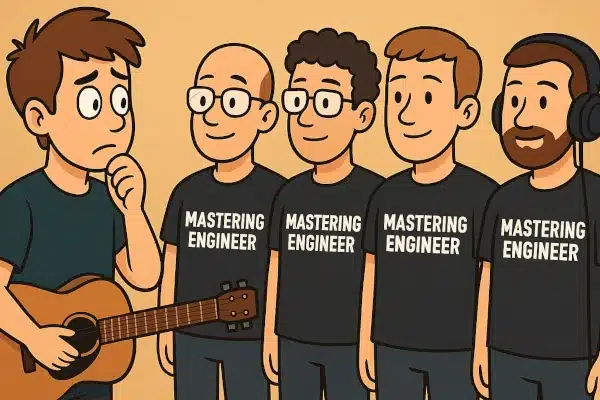When you’ve poured your heart into a mix and finally reached the finish line, one critical question remains: who’s going to master your music? Choosing the right mastering engineer can make all the difference between a track that sounds good and one that sounds great everywhere it’s played.
But how do you actually know who’s right for your project? In this guide, we’ll break down what to look for, what questions to ask, and how to find a mastering engineer who understands both your music and your vision.
What a Mastering Engineer Actually Does
Mastering is often misunderstood. Many think it’s just about making a song louder, but it’s really about bringing out the best version of your mix — polishing tone, balance, and dynamics so your track sounds consistent across every playback system.
A mastering engineer applies critical technical and creative judgment to:
- Balance EQ and dynamics for translation across all devices.
- Match the loudness and tone of other professional releases.
- Prepare final versions for streaming, radio, or vinyl.
- Add metadata and ensure compliance with platform standards.
In short, they take your finished mix and turn it into something release-ready — ensuring it holds its own in the competitive world of modern music.
If you’re unsure where to start, studios like Moreish Studios specialise in professional mastering for artists across Australia and beyond.
1. Look for Someone Who Understands Your Genre
Every genre has its own mastering aesthetic. A hip-hop track needs punch and warmth; an indie song might call for openness and dynamics; an EDM record thrives on clarity and impact.
When researching mastering engineers, listen to their past work — especially projects in your genre. Does it sound like the kind of polish you want for your own songs? Good engineers often post audio samples or credits online. You’ll quickly get a feel for their sonic style, and whether it complements your sound or not.
Tip: Don’t just look for famous names — look for engineers who’ve mastered artists you admire in a similar style.
2. Pay Attention to Communication and Collaboration
Mastering is both a technical process and a creative conversation. You need someone who listens — not only to your track but also to your feedback and artistic direction.
Ask yourself:
- Are they easy to reach and responsive to questions?
- Do they offer revisions or feedback on the mix before mastering?
- Do they make you feel like a partner in the process?
At Moreish Studios, mastering isn’t just a one-way service — it’s a collaboration. We take time to understand your music’s intent, making sure the final master reflects your original vision.
3. Check Their Technical Setup
While creativity matters most, mastering relies heavily on acoustics, monitoring, and precision tools. Look for a mastering studio with:
- Professionally treated rooms
- Accurate monitoring systems
- High-quality analog and digital mastering chains
These tools help the engineer make microscopic adjustments that can elevate your music from good to exceptional. If a studio has invested in its gear and space, it usually means they take your sound seriously — and have the resources to deliver world-class results.
4. Ask for Test Masters or References
Before committing to a full album or EP, ask if the engineer offers a single test master. This allows you to hear how they interpret your sound and make sure it aligns with your expectations.
Many professional mastering engineers (including Moreish Studios) are happy to do this for first-time clients — it builds trust and ensures both sides are on the same page.
5. Compare Cost — But Don’t Base Your Decision on Price Alone
It’s tempting to choose the cheapest option, but mastering is one of those areas where you truly get what you pay for.
In Australia, music mastering typically costs between $80 and $200 per track, depending on the engineer’s experience, the complexity of the mix, and whether you need stem mastering or special formats.
Cheaper online options can sound flat or inconsistent — often using automated software that misses the emotion and depth a real engineer can bring. Your music deserves a human touch from someone who understands what you’re trying to say sonically.
6. Look for Consistency and Care
A great mastering engineer doesn’t just fix problems — they care about the music. They’ll take the time to:
- Preserve dynamics instead of crushing them.
- Enhance the mix’s emotion, not just its loudness.
- Make sure each track in a project flows seamlessly into the next.
If your engineer talks about the feel of your track, not just the levels, that’s usually a very good sign.
7. Check Their Revisions and Delivery Options
Before booking, find out:
- How many revisions are included?
- What formats you’ll receive (WAV, MP3, DDP, streaming versions)?
- Whether mastering for platforms like Spotify or Apple Music is included?
A professional engineer will be transparent about these details — and will ensure you have everything you need for distribution.
8. Trust Your Ears and Gut
Ultimately, the best mastering engineer for you is the one who makes your music sound like you imagined it — only better. Trust your instincts. If an engineer’s work excites you and their communication feels natural, that’s usually a good fit.
Final Thoughts
Choosing the right mastering engineer is a crucial step in the journey from mix to release. It’s not just about the technical side — it’s about collaboration, emotion, and mutual understanding.
At Moreish Studios, we treat mastering as the final creative polish that bridges your artistic intent and the listener’s experience. Whether you’re mastering a single or a full album, our goal is to make your sound stand out — with warmth, clarity, and impact.
If you’re ready to elevate your mix and prepare it for release, explore our music mastering services or get in touch for a quote today.


